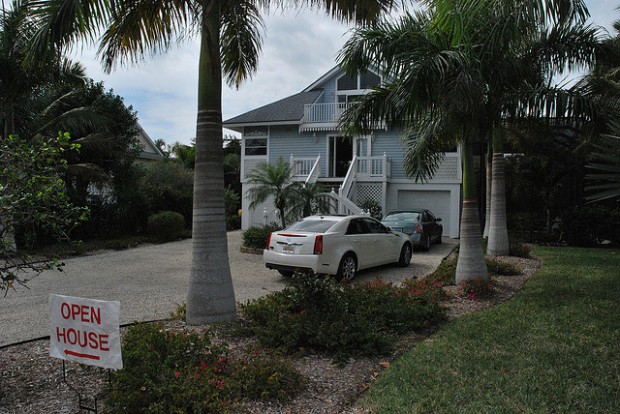What Your Broker Isn’t Telling You About International Investments
It’s true that the consumer marketplace is becoming increasingly more global. Look around you. Check the tags on some of your clothing, the stickers on your fruit, or the assembly information on your electronics.
Chances are you’re surrounded by things that were grown, developed, or manufactured in places other than North America. It’s the state of the world these days.

Victor Amark
Now look at your investments. The odds are here that you’re probably buying goods from all corners of the globe yet your portfolio is heavily, if not entirely, invested in only U.S. stocks and other financial products. And that’s understandable.
International investing is an intimidating concept, particularly for the individual investor but even for the large firm whose name may appear on your quarterly financial statement. (Although that has more to do with the fact that they lack the resources to due the necessary due diligence or the willingness to assume any risks associated with foreign investments.)
It’s not that your broker doesn’t see the value of international options. It’s just that pitching them to his boss (who would be required to sign off on such an unconventional investment) would probably get him laughed out of the office at best. Most firms just aren’t set up to accept those types of holdings.
*Note: An obvious exception here are mutual funds, as there are many international funds where advisors will probably recommend that you stash 20-30% of your portfolio. Individual foreign stocks are also becoming increasingly more accessible, but they can often result in more hassle and foreign commissions.
What we’re suggesting is more of a hands-on approach to your international investing. You’ll save on commissions and fees, and you’ll also have the ability to sell underperforming stocks and reap the tax benefits.
That being said, we aren’t investment gurus or tax professionals. We’re just a couple of guys who’ve seen from our own experience in the international market that the following are some very real truths and benefits to international investing.

Victor Amark
1. If you only invest in U.S. markets, you’re missing out on over half of the options out there.
It’s true that the U.S. stock market is the world’s largest. However, when looking at the bigger picture, it only represents 49% of the $24.2 trillion value (as of 2010) of the world’s stocks. Throw in the U.K. (10%), Japan (10%), the rest of Europe (19%), the Pacific (6%), and Canada (5%) and you’ve doubled your choices.
If you’re limiting your portfolio to only U.S. stocks and domestic mutual funds, you’re only skimming the surface of the available investment options.
2. If you assume the U.S. is always number one, you’re wrong.
Whether you realize it or not, the U.S. isn’t always at the top of the charts when it comes to investment performance. In fact, in looking at the past four decades, the U.S. stock market came in dead last in two of them when compared to the annualized returns of other world indexes (according to the Ibbotson Stocks, Bonds, Bills, and Inflation Yearbook).
If you’re wondering, those worst decades were the 1970s (5.9%) and the 2000’s (-.9%). Only in the 90s did the U.S. outperform all the other indexes with 18.2% returns.
Interestingly, over the course of those 40 years, all the indexes averaged between 9.6% and 10.7%, with the U.S. coming it at an even 10%. So, while there’s not one region that consistently outperforms the others, the U.S. does not do so either. In other words, there’s just no logical reason to ignore international investments.
3. Neither is the U.S. leading in innovation.
There was a time when the U.S. was leading the world in technology, development, and innovation. That time was the 1970s. It’s well behind us.
Today the country cranking out the most patents is Japan. The U.S. is next, followed by China and South Korea. If you look at patent applications relative to factors like GDP and population, the U.S. falls even further down the list.
This just proves that the U.S. is no longer the leader in innovation and economic development. Other nations are catching up fast, and the only way to take advantage and ride the wave of their rapid growth is to invest in international stocks.

F Delventhal
4. Diversification protects against a number of risks.
We mentioned that there are ups and downs across the global market and it’s impossible to know which will perform well in any given year. Different countries are affected in various ways by things such as economic and political stimuli, as well as natural disasters and other factors. Investing in countries with little cross-correlations can greatly reduce risk.
Performance is understandably a huge motivating factor for international diversification. When money is invested in assets with similar long-term returns but differing short-term returns, the most effective strategy has proven to be holding a varied mix of those investments.
For example, given the 1970-2010 average returns mentioned earlier, $1,000 invested in a global portfolio turned into $65,307 vs. $49,378 in only Pacific stocks, $49,655 in U.S. stocks, or $63,906 invested in ony European stocks. Consequently, the best strategy appears to be to hold a portfolio that’s diversified across several countries.
*The exception here is during periods of global financial crises, in which across-the-board losses are often unpreventable.
Exchange risks are another area where diversification offers protection. Since the relationships between currency values change on a daily basis, international investing can also provide a hedge against the struggling U.S. dollar. Considering the U.S. government finances much of its shenanigans by merely printing more money, this is an important benefit.
5. While there are risks with international investments, they’re easily outnumbered by the benefits.
No investment comes without some level of risk. And, considering the volatility of international markets, international stocks are more risky than domestic ones.
When dealing with overseas investments there are also factors like political instability and shaky property rights. Other worries include looser government regulations, which can lead to problems like manipulation and fraud.
There are also the aforementioned exchange risks should another country’s currency lose value in relation to the dollar. So an increase in the exchange value of the dollar, a good thing for the U.S. in general, would in essence actually hurt the value of your foreign investments.
Not to mention, it’s hard enough to keep up with the goings on in the domestic economy, much less monitor headlines to determine if China’s bubble is likely to burst or whether Greece’s economic turmoil could in turn send all of Europe down the tubes.
Then again, it’s equally difficult and even more risky to rely solely on the performance of U.S. stocks. Despite the volatility in markets across the globe, the Vanguard Total International Stock Index reports a 7.21% 3-month return vs. only a 4.79% increase for the S&P 500 during the same period.

Pat (Cletch) Williams
6. Real estate is a great option for a less volatile long-term investment.
When choosing from a number of vehicles in which to invest abroad, real estate is a great option for even the most amateur investor. It offers some huge benefits over less tangible investments. Not to mention, it’s actually something you can USE if you’d like.
Real estate is finite. There’s only so much of it. Values can certainly fluctuate, but at the end of the day it always holds some intrinsic value. That’s more than you can say about a stock certificate. Land also has the benefit of being exempt from exchange risks, since it’s a hard asset that retains its value independent of any fluctuations in currency values.
Another perk is that a land investment is also yours to do with as you choose. You can sell it, rent it, develop it, or merely hold on to it for a while until a significant event, such as a new road or nearby development, causes its value to increase due to no action on your part whatsoever.
Not to mention, owning land is FUN. When you invest in a piece of property or a development, you have the ability to influence what goes on there. You’re invested not only in the dirt and trees, but in the community and its future.
Why We Believe So Strongly in International Real Estate Investments
This is one of the things we love about building our Adventure Colonies. We go in to emerging areas, find land that’s a great deal, develop it into usable lots or home sites, and then sell those to people who share our vision for the area.
Some buy the land to use as a place to retire or raise their families. Others choose a spot where they can launch the ecotourism business they’ve always dreamed of. Still more simply invest in the project because they believe in our mission and see can see the potential to profit tremendously as the surrounding area continues to grow and develop. And land investments can meet all of those goals.
If you’d like to learn more about investing in international real estate and our proven blueprint for success in this arena, check out our free ebook Pay Dirt. We believe in this model for international land investment, and we’d love to share our experience with you.
Up Next

7 of the Top Places U.S. Expats Are Living in Latin America (and Why)

Central America's Best Real Estate Buy

The World’s Top 10 Best Places to Put Your Money

Nosara, Costa Rica Everything You Need to Know. I Mean Everything.
Imagine a small, beautiful beach town surrounded by jungle and wildlife with a peaceful multicultural community and many of the comforts of home. That place, named by National Geographic as one of the top surf …
(Read It)
Panama City, Panama Real Estate Market Update
Today we have a guest post written by Kent Davis, owner of one of the most successful real estate brokerages in Panama City The Panama City real estate market may have finally taken a turn in …
(Read It)
Top 133 Costa Rica Websites for Expats and Investors
Did you know there are dozens and dozens of great resources on Costa Rica for expats and investors? Sure, we have a ton of resources for Costa Rica on our site, and a whole bunch …
(Read It)
The Truth about Living in Costa Rica: The Good, the Bad, and the Muddy
It's easy to find tons of articles and information out there highlighting all the great benefits of living in Costa Rica. But it's also easy to read those blogs and marketing pieces and think, "Yeah, it …
(Read It)
Why Nosara, Costa Rica Is Not Your Average Surfing Town
A deeper look at Nosara and its history will quickly reveal that this long-time mecca for surfing enthusiasts offers so much more than just the sand and sea. The increasing interest in the area as a …
(Read It)
Expats Are Still Falling in Love with Nosara and Here’s Why
What was once the up-and-coming expat haven of Nosara, Costa Rica, has blossomed into one of Costa Rica's most established expat communities that continues to be ranked near the top of the list of most desirable destinations in the Latin …
(Read It)












